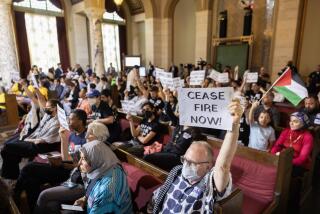Clinton Drops Walking Tour of Jerusalem : Mideast: Tired President cancels plans amid Arab-Israeli controversy over Holy City’s future. First Lady goes in his place.
JERUSALEM — What President Clinton wanted to see in Jerusalem was what every visitor wants to see--the walled Old City, the Church of the Holy Sepulcher, the Via Dolorosa, the Western Wall of Judaism’s Second Temple, Al Aqsa Mosque.
But even before he set foot in the city Thursday, Clinton ran into the most sensitive and probably the most difficult issue in the Arab-Israeli conflict--the future of Jerusalem and its religious shrines--and in the end he canceled the walking tour his staff had carefully planned for days.
“I’m on my last leg--I’m really tired,” Clinton said, arriving an hour late from Damascus, the third capital of his six-nation tour, and looking very weary indeed.
The President instead dispatched Hillary Rodham Clinton to the Western Wall, Judaism’s holiest site as the only major part that remains of King Herod’s temple. The couple had toured the Old City more than a decade ago on a visit the President recalled in a speech to Israel’s Parliament later in the day.
Amid elaborate security precautions--the virtual clearing of all the men and women who had been praying at the wall, a check of its numerous chinks and holes and a cordon of hundreds of police--Mrs. Clinton went to the wall for about 15 minutes Thursday evening and prayed there briefly.
Although Clinton’s fatigue was real, the political controversy had proved insoluble--even to veterans of the Middle East peace negotiations.
Israelis, who describe Jerusalem as “the united and eternal capital of the Jewish people and State of Israel,” objected strongly to Clinton’s request that Mayor Ehud Olmert not accompany him on the planned excursion, lest that act signify U.S. acceptance of the Israeli claim--as Olmert said it would.
“There is a united Jerusalem,” Olmert said. “When the mayor visits along with the President, it is just an issue of protocol. But the minute someone says to a mayor you cannot visit a certain party (of the city), a political problem is created. . . .
“What is more important is that we agree among ourselves. As long as we agree regarding the status of Jerusalem, and we show determination and strength and unity regarding its future, its status and its integrity, other things can be important but won’t be determining.”
Palestinians, who envision Arab East Jerusalem as the capital of an independent Palestinian state, said they would close the doors of Al Aqsa to Clinton if he were accompanied by Olmert, an opponent of Israel’s accord with the Palestine Liberation Organization on Palestinian self-government.
“We see Jerusalem as an area where the status is not yet defined or decided,” said Ziad abu Zayyad, a prominent member of the PLO’s mainstream Fatah faction. “Any official visit by a public personality to East Jerusalem may imply that they recognize it as part of Israel.”
Most countries, including the United States, did not recognize Israel’s incorporation of Arab East Jerusalem into the boundaries of its capital city after the 1967 Arab-Israeli War when it was captured from Jordan; in fact, most other countries regard the status of Jerusalem as an unresolved international question and have kept their embassies in Tel Aviv.
A dozen compromises, such as a group of religious leaders to greet the President and show him the shrines, were proposed but pleased no one.
Faisal Husseini, a minister in the Palestinian Authority, commented, “The situation is that now the whole issue of Jerusalem is on the agenda, and every move takes on political implications so that everything is sensitive. Once again, Israel failed to prove it has full authority over Jerusalem.”
When Clinton decided that problem was just too difficult to resolve in an evening and canceled the tour, American and Israeli security personnel rejoiced. They had grown increasingly anxious about the plan for the late-night walking tour through the Old City’s maze of crowded streets and narrow alleyways.
“We were going to line his whole route with police, shoulder to shoulder,” a senior officer said. “We already had 2,500 men in the Old City, and we were going to have to close it in its entirety to protect the President. This was a huge undertaking.”
Elaborate security measures have been taken to protect Clinton in the wake of a series of terrorist attacks here this month by Muslim militants belonging to the Islamic Resistance Movement, known as Hamas.
More to Read
Sign up for Essential California
The most important California stories and recommendations in your inbox every morning.
You may occasionally receive promotional content from the Los Angeles Times.










